He turned and looked back at his island, a vague darkness in the mist, and turned back to his chore, only to find himself staring at a blue hull inches in front of his eyes. It had appeared so suddenly, with so little warning, his first impression was that he was being run down, and gave a hoarse yell and sloshed backward in the thigh-deep water, stumbling, catching his balance.
“Dumb fool!” he shouted. Then he saw how it was moving, almost stern first, slightly crabwise, a line trailing from the bow. With no wind, and with the tide moving as it was, it had to have come in through the inlet to be moving across this flat. It had drifted right across the waterway and into his bay. Fine boat. New looking. Florida number on the bow.
Corpo reached and caught the bow line and started gathering the loose end in, coiling it as he did so. There was enough weed entangled in the line to convince him the boat had been adrift a long time. He put the coiled line up on the bow. He sloshed around the boat. He could not see into it, it had so much freeboard, but he reached high, slung his sack of scallops over the gunnel, lowered it and let it drop the final few inches.
At the transom he spoke the name and port aloud. “Muñequita. Brownsville, Texas. And that’s for sure one hell of a drift. No, you got a Florida number. And that’s weed from the ocean out there. Got your little propellers tilted up clear of the water. End of all that bow line too unraveled to tell much how it parted. Say you must have been riding an anchor, swinging too much maybe. Get a tide change and slack and you put a loop over a fluke, then when it comes tight again, it could fray. You’re pretty new, aren’t you now? Not a mark on those propellers. Walk you home and tuck you under my front stoop and find out how bad some poor fool wants you back.”
Suddenly Corpo noticed a little folding bronze step plate at the transom corner, just above the waterline. He folded it down on its hinge, got a foot on it, reached up and caught the grab handle and pulled himself erect on the step and stared into the teak cockpit.
“Motheragod!” he said, launched himself backwards, landed, stumbled and fell, came gasping to his feet in water deeper than he had expected. Wind riffled the water and the boat moved on. He hesitated a moment and then floundered after it, jumped and got the grab handle, knee on the folding step, worked his way up, sat on the broad transom, swung his legs into the boat.
As he took two strides toward her, he wiped his hand on his sodden pants, bent over and laid two fingers on the side of her throat just under the angle of the jaw. There was something there. A faint thing. A flutter. Not the bump-bump-bump you always felt when they weren’t hit bad.
He looked with consternation at the brightness, knowing the mist was burning off. Looking straight up he could see the first blue glaze through mist.
He went around her to the controls, pulled the nylon cover off, wiped his hands on his thighs as he studied them. Both keys in place, brass-bright. Quarter turn right for on. These little toggles should drop the props into the water. Hiss and chunk. Okay so far. Throttles in neutral? Starter buttons. Try it, Corpo.
One caught very quickly. The other ground for several long seconds and caught. He revved them with several quick hard bursts on each one, then at slow speed slipped them into gear. The boat moved. Exhaust bubbled astern. Water whispered along the bow. He turned the boat, tried more throttle, startled himself with the way it jumped. He pulled it back down. Just as he eased it slowly into his channel he looked west and saw the candy houses beginning to show through the mist, looked east and saw a motor sailer moving south down the Waterway toward Fort Lauderdale.
He had trouble in his narrow channel. At the turns the stern would swing too far, brush the roots. The channel widened at the cabin, where for so long he had used the very lowest tides at the time to chop out the dead roots, grub out the muck, sand and dead shell and use it to build up the land around the cabin. With engines off, he glided slowly under the platform porch, nudging his skiff rudely aside as he scrambled forward, fended the boat off the house pilings, then made it fast at bow and stern.
He picked up the damp sack of scallops and went up the stairs, pushed the trapdoor open from below, climbed into his living quarters. He dumped the scallops into a shallow washtub, went out onto his front porch, dropped a bucket on a line, pulled up enough water to cover them. They began to move around in the washtub.
“Taste the best that time I fried you with the butter and onions, didn’t you now?”
He wondered when would be the best time to eat them. They’d keep fine. Maybe late in the day.
“Got me a good mess of you scallop folks that time I found that girl in that boat, too.”
Now when was that? Last year, or yesterday, or was it something going to happen, or by God, was it now!
He went to his think place, put his hands around the poles he had cut for supports, rested his forehead against the wall timber. He closed his hands as hard as he could, hard enough to make his shoulder muscles creak and pop. The poles were shiny where he had grabbed them a thousand times, the timber stained where he had rocked his head back and forth on it.
Everything would open up for you and turn loose, so you didn’t know where you were. You had to pull it back and lace it down. You had to shut your eyes and think of a row of poles closing you in like a fence on each side of you, so that tomorrow was ahead, and yesterday was right behind you, and last month and last year were way back. Then you could get the shape of yesterday and the day before, and from that you could make it into now.
Yes, she was down there right now.
Clucking with exasperation at himself, he stripped his bed, flipped the mattress over, got the other sheets out of the box and made it up fresh.
He took a clean cotton blanket down to the boat, spread it on the deck beside the girl, and gently rolled her over onto it, trying not to look directly at her. He wrapped it around her, slid his hands under the blanket and stood up with her, astonished at how light she was. It was easier to carry her out and around and up the front way. He put her on the narrow bed and went back and closed his screened door, noticing the last of the mist was burned away.
He opened the petcock and ran some rainwater from his roof cistern into a basin, washed his hands with the sliver of yellow soap, dried them on sacking. He ran rainwater into the pot, pumped the little gasoline stove, lit the burner, put the pot on. Then he went over and sat on his heels and looked at her. Pretty enough little face, but the bones behind it looked sharp enough to come right through the skin. Skin worn off her cheek, mound of her forehead, edge of her jaw. He puzzled it out and decided it could have been rubbed against the teak deck just that way if the boat moved around much. Scrawny little arm about as big around as a turkey leg. He felt her forehead and clucked again, and said, “Just like a fire inside there, missy. You’ve got a fire that’s burning the meat right off your little bones.”
When he turned her head gently, he found the worst place. Where the fair hair was matted and tangled dark, above her ear. He fingered the hair pad away, separating it, and found the wound, perhaps two inches long, gaping almost an inch wide in the middle. It had been rain-washed, and had a skin of healing over it, but the lips of the wound were swollen and granular. He sucked his mouth in and held his breath and prodded at it with a gentle finger, but he could feel no give or shift of the bone under the wound, no fatal sponginess.
“Missy, you got a good hard little skull, or somebody didn’t get a good solid swing at you with that rifle butt. What that needs is some sewing, and maybe I can and maybe I can’t. All depends.”
Читать дальше
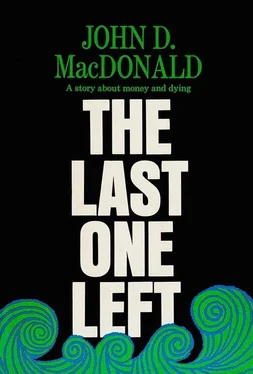

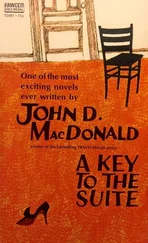
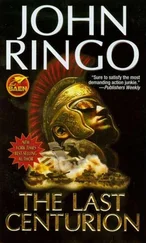


![Джон Макдональд - Wine of the Dreamers [= Planet of the Dreamers]](/books/430039/dzhon-makdonald-wine-of-the-dreamers-planet-of-thumb.webp)

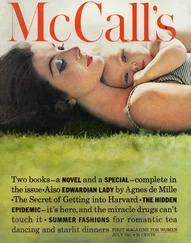
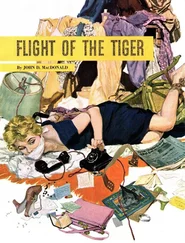
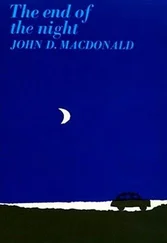
![Джон Макдональд - The Hunted [Short Story]](/books/433679/dzhon-makdonald-the-hunted-short-story-thumb.webp)
